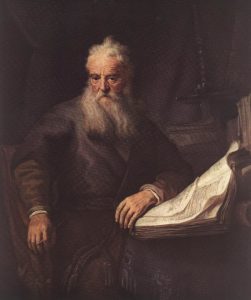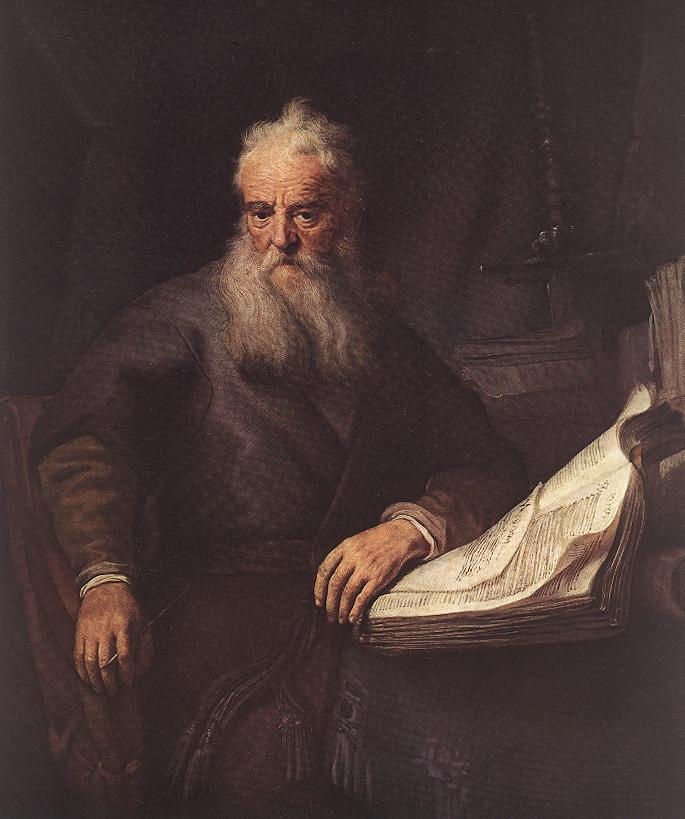
Paul: “At times he looked like a man, and at times he had the face of an angel.” Act of Paul and Thecla
Blessed are you when people revile you and persecute you and utter all kinds of evil against you falsely on my account. Rejoice and be glad, for your reward is great in heaven, for in the same way they persecuted the prophets who were before you (Matthew 5:11-12).
If this blessing of the persecuted ever blessed anyone, it was Paul. Formerly a persecutor of the church, he became a church planter, gospel messenger to the Gentiles, and ultimately, martyr. Tirelessly he preached grace for all through the death and resurrection of Christ and built up the church as the body of Christ – a message of love and joy. For that, he faced constant criticism from within by those who competed for leadership and repeated persecution from without by those whose power his message threatened.
Against his competitors, he defended himself not by denying but by citing his sufferings (see 2 Corinthians 11:22-33). He quoted Christ: “My grace is sufficient for you, for power is made perfect in weakness” (2 Corinthians 12:9). His weakness only strengthened his credibility as a “clay jar” that does not call attention to itself but delivers God’s “treasure” (2 Corinthians 4:7).
Paul wrote letters to build up, chide, cajole, and enlighten particular churches as they tried to get their bearings in a world that often did not understand them or their Lord. The master rhetorician and Pharisee delivered impactful words, but as a disciple of Peter wrote,
So also our beloved brother Paul wrote to you according to the wisdom given him, speaking of this as he does in all his letters. There are some things in them hard to understand, which the ignorant and unstable twist to their own destruction, as they do the other scriptures (2 Peter 3:15b-16).
So it has been for two thousand years, and so it is even today. Many find Paul exasperating and wish to ignore him as if they can get the pure, unadulterated truth from the gospels alone. But despite Paul’s human imperfections, the gospels validate Paul’s witness, for instance, as one persecuted on Christ’s account.
For those who find Paul perplexing, I cannot recommend highly enough Frederick Buechner’s entry on him in Peculiar Treasures: A Biblical Who’s Who (pp.128-133). In only five pages, Buechner captures the complex message and man succinctly and clearly. Moreover, it is the only tear-jerker I have ever read on Paul.
The entry is too long to quote fully in a blog post, but he does not waste a word. I cannot summarize such a succinct summary. But I will invite you with a sampling of favorite passages:
-
He wasn’t much to look at. “Bald-headed, bowlegged, strongly built, a man small in size, with meeting eyebrows, with a rather large nose.” Years after his death, that is how the apocryphal Acts of Paul and Thecla describes him, and Paul himself quotes somebody who had actually seen him: “His letters are strong, but his bodily presence is weak” (2 Corinthians 10:10). It was no wonder.
-
He planted churches the way Johnny Appleseed planted trees. And whenever he had ten minutes to spare, he wrote letters. He bullied. He coaxed. He comforted. He cursed. He bared his soul. He reminisced. He complained. He theologized. He inspired. He exulted. Punch-drunk and Christ-drunk, he kept in touch with everybody. The postage alone must have cost him a fortune, not counting the energy and time. And where did it all start? On the road as you might expect. He was still in charge of a Pharisee goon squad in those days and was hell-bent for Damascus to round up some trouble-making Christians and bring them to justice. And then it happened.
-
Everything he ever said or wrote or did from that day forward was an attempt to bowl over the human race as he’d been bowled over himself while he lay there with dust in his mouth and road apples down the front of his shirt: Don’t fight them, join them. He wants you on his side. YOU of all people. ME. Who in the world, who in the solar system, the galaxy, could ever have expected it? He knew it was a wild and crazy business – “the folly of what we preach,” he said – but he preached it anyway. “A fool for Christ’s sake,” he called himself as well as weak in his bodily presence, but he knew that “the folly of God was wiser than the wisdom of men and the weakness of God was stronger than men” (1 Corinthians 1:18-25). There were times he got so carried away that his language went all out of whack. Infinitives split like atoms, syntax exploded, participles were left dangling.
-
“By grace you have been saved,” he wrote to the Ephesians, and grace was his key word. GRACE. Salvation was free, gratis. There was nothing you had to do to earn it, nothing you could do to earn it….”For we are his workmanship, created in Christ Jesus for good works,” he wrote; in other words, good works were part of it, all right, but after the fact, not before (Ephesians 2:8-10)….Little by little the forgiven person becomes the forgiving person, the person who found he was loved became capable of love, the slob that God had had faith in anyway became de-slobbed, faithful and good works blossomed….like fruit from a well-watered tree. What fruit? Love, Paul wrote….
-
And Christ was his other key word, of course. CHRIST – the key to the key. He never forgot how he called him by name – twice, to make sure it got through – and “while we were yet sinners, Christ died for us,” he wrote out for the Romans (Romans 5:6) and for the Galatians again, “I have been crucified with Christ” – all that was dried up in him, full of hate and self-hating, self-serving and sick, all of it behind him now, dead as a doornail – so that “it is no longer I who live but Christ who lives in me” (Galatians 2:20). And then to the Philippians by registered mail, return receipt requested: “For to me to live is Christ” (Philippians 1:21), and to the Ephesians, for fear they’d feel neglected if the mailman came empty-handed. “You he made alive when you were dead” (Ephesians 2:1). Alive like him.
-
Where was it all going to get him in the end? Where was it all going to get any of them in the end? When you came right down to it, what was God up to, for God’s sweet sake, sending them all out….to beat their gums and work themselves into an early grave?….God was making a body for Christ, Paul said. Christ didn’t have a regular body any more so God was making him one out of anybody he could find who looked as if he might just possibly do. He was using other people’s hands to be Christ’s hands and other people’s feet to be Christ’s feet, and when there was some place where Christ was needed and needed bad, he put the finger on some maybe-not-all-that-innocent bystander and got him to go and be Christ in that place himself for lack of anybody better.
-
Nobody’s sure whether he ever got to Spain the way he’d planned or not, but either before he went or soon after he got back, he had his final run-in with the authorities, and the story is that they took him to a spot about three miles out of Rome and right there on the road, where he’d spent most of his life including what was in a way the beginning of his life, they lopped off his head….At the end of it’s less than flattering description of his personal appearance, the Acts of Paul and Thecla says that, “at times he looked like a man, and at times he had the face of an angel.” If there is a God in heaven, as even in his darkest moments Paul never doubted there was, then bald-headed and bow-legged as he was, with those eyebrows that met and that over-sized nose, it was with angel eyes that he exchanged a last long glance with his executioners.
Other Posts on Frederick Buechner and the Beatitudes. The post above completes the series.
“The Presence of Peace” After the Wars Of the Day
The Alphabet of Grace: On Experiencing God In Everyday Life
“The Miracles at Hand”: Buechner on the Good Samaritan
Vocation: Your Deep Gladness Meets the World’s Deep Hunger
Clay Jars and Peculiar Treasures: Saints In Buechner’s Writings
Two Books On Telling For Those Who Mourn
Frederick Buechner: Putting Color Back In the Cheeks Of Grace
Other Posts on Paul
Realizing Hope: Sermon on Romans 5:1-5
Image: Rembrandt, Apostle Paul, 1633 (?), Public Domain, Wikimedia Commons.


Dear Marshall, I have a new favorite word, “de-slobbed”. Thanks for yet another wonderful post. Y’all have a warm sweet Christmas. Much Love, Cinda
Great to hear from you, Cinda. Have a Merry Christmas and a de-slobbed New Year!